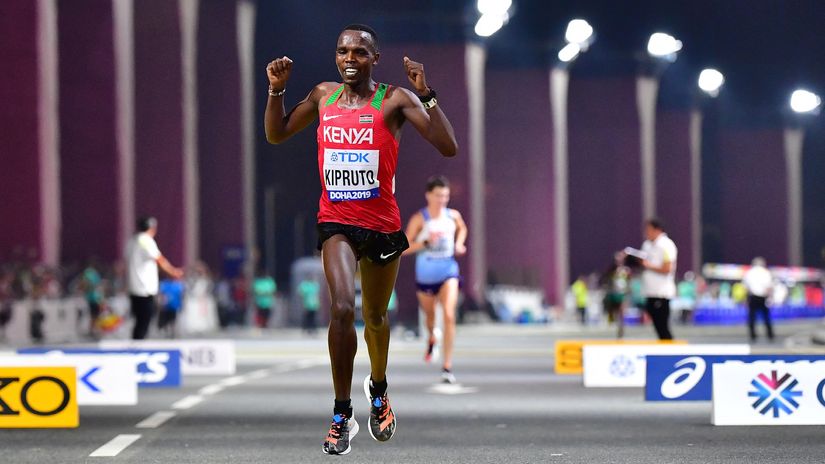Amos Kipruto, the renowned marathon runner with a distinguished track record, has raised concerns about the new marathon qualifying standards set for the 2025 World Athletics Championships in Tokyo. The updated qualification time has been set at 2:06:30, a significant increase from the 2:08:10 required for the previous championships in Budapest. Kipruto, a seasoned athlete with multiple world major medals, believes this new benchmark might be overly demanding for many marathoners.
New Standards Raise the Bar for Tokyo 2025
The World Athletics Championships, renowned for showcasing the best in track and field, have introduced stricter qualifying times for the marathon event. The new standard of 2:06:30 represents a substantial leap from the previous qualification time of 2:08:10 set for the Budapest championships. This change is intended to ensure that only the most elite marathoners qualify for the prestigious event in Tokyo.

Kipruto, who has a notable career including a bronze medal at the 2019 World Championships and victory at the 2022 London Marathon, has voiced his concerns about the increased difficulty of achieving the new qualification times. He argues that these new standards could be challenging for many athletes striving to compete at the world stage.
Kipruto’s Perspective on the New Qualifying Times
Amos Kipruto’s experience and success in marathon running provide him with a unique perspective on the impact of the new qualification standards. “The qualification time is quite high, and even the previous time of 2:10 might be challenging for many,” Kipruto remarked. He acknowledges that meeting the new qualifying standard will require exceptional dedication and effort from athletes. Despite these challenges, Kipruto remains optimistic about the capabilities of Kenyan marathoners, who have a strong tradition of success in long-distance running.
The increased qualification time aims to filter the field, ensuring that only the most competitive athletes make it to Tokyo. However, his critique highlights the potential hurdles that many marathoners might face in their quest to qualify for the world championships.
Preparing for the Chicago Marathon
As the marathon world adapts to the new qualifying standards, Kipruto is focusing on his preparation for the upcoming Chicago Marathon. Scheduled for next month, the Chicago Marathon represents a crucial opportunity for Kipruto to showcase his form and readiness for future competitions.

Kipruto’s preparation involves rigorous training and a commitment to achieving peak physical condition. His goal is not only to perform well in Chicago but also to secure a spot on the Kenyan team for the Tokyo 2025 championships. Kipruto’s dedication to his training reflects his determination to overcome the challenges posed by the new qualifying standards.
Kipruto’s Aspirations for the Kenyan Team
Amos Kipruto’s aspiration to return to the Kenyan team for the World Athletics Championships is driven by his desire to continue representing Kenya on the global stage. Having previously secured a bronze medal in the 2019 World Championships, Kipruto is eager to add to Kenya’s legacy of marathon success.
“It is always an honor to represent Kenya out there,” Kipruto stated. He is hopeful that Athletics Kenya will favor him for the upcoming championships and is determined to contribute to the country’s pursuit of marathon glory. Kipruto’s commitment to achieving the necessary fitness levels underscores his dedication to both his personal goals and his role in upholding Kenya’s esteemed position in marathon running.

Conclusion: A High Bar for Marathon Excellence
The introduction of tougher marathon qualifying times for the Tokyo 2025 World Athletics Championships sets a high bar for athletes aspiring to compete at the world’s premier track and field event. While the new standard of 2:06:30 aims to ensure the participation of the most elite runners, it also presents significant challenges for many.
Amos Kipruto’s critique of these new standards highlights the potential difficulties faced by marathoners as they strive to meet the rigorous requirements. His own preparations for the Chicago Marathon and his ambition to represent Kenya in Tokyo reflect his commitment to overcoming these challenges.
As the marathon community adapts to these changes, his insights serve as a valuable perspective on the evolving landscape of marathon running and the pursuit of excellence in the sport.


